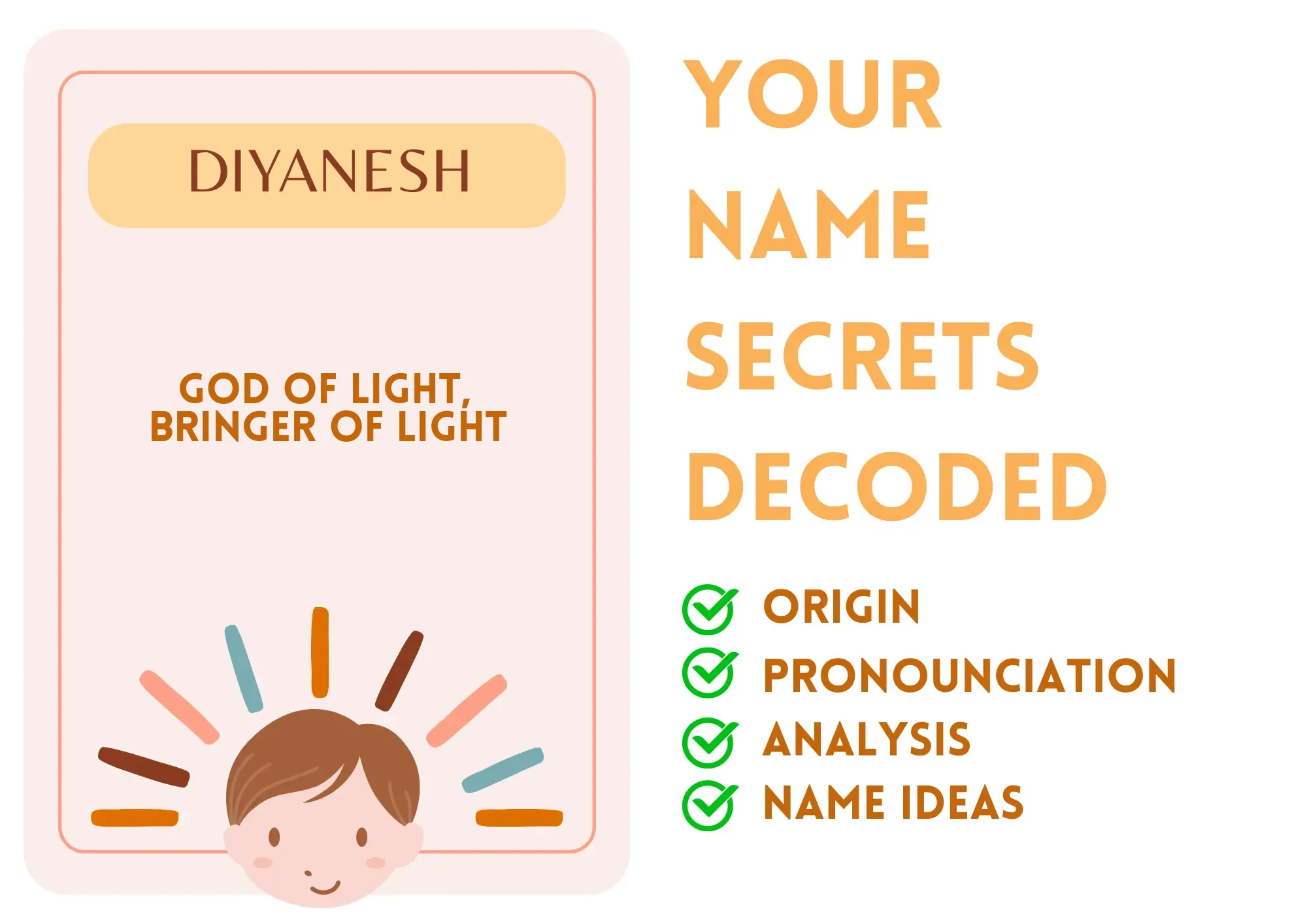
Diyanesh
Diyanesh is a distinguished name rooted in Indian culture, deriving from Sanskrit. It is often interpreted to mean 'God of Light' or 'Bringer of Light', which holds significant spiritual and symbolic implications within Hinduism. Generally used for boys, Diyanesh reflects a divine quality, intending to symbolize illumination and guidance.
The name is perceived positively and carries a sense of nobility, strength, and wisdom. It is relatively easy to pronounce and write, with a melodic flow that makes it appealing. The nickname 'Diyu' is common among family and friends, contributing to a sense of affection.
Diyanesh has not been widely featured in popular culture, but its ethereal meaning makes it suitable for characters in literature or storytelling that focus on themes of light and enlightenment, making it an ideal choice for parents seeking a name with deep significance.
Basic Information
Gender: Boy
Sounds Like: DEE-yah-nesh
Pronunciation Explanation: The emphasis is on the first syllable 'DEE', followed by a soft 'yah' and ending with 'nesh'.
Summary and Meaning
Meaning: God of Light, Bringer of Light
Origin: The name Diyanesh has Indian origins, deeply ingrained in Hindu culture and Sanskrit language.
Usage: Diyanesh is traditionally a masculine name, commonly used for boys.
Name Number (Chaldean)
Name Number (Pythagorean)
Name Constellation (Nakshatra)
Name Zodiac Sign (Rashi)
Popularity (Global Rank)
Overall: 572751
Boys: 72681
Most Popular in
Religious and Cultural Significance
Religion: Hindu
Background: In Hindu culture, Diyanesh connects to the concept of divinity and spirituality, often associated with light as a representation of knowledge and enlightenment.
Cultural Significance: Diyanesh is esteemed for its spiritual implications and is often chosen for boys born under auspicious circumstances, symbolizing a bright future.
Historical Significance: Historically, names meaning 'light' or 'God of Light' are prevalent in Hindu texts and philosophies, symbolizing wisdom, purity, and enlightenment.
Popular Culture
Literature and Mythology: While the name Diyanesh may not be widely recognized in popular literature, its meaning aligns with themes of light and spirituality found in various Hindu mythological stories.
Movies and Television: There are no prominent characters named Diyanesh in mainstream media, but its meaningful essence could fit well in narratives emphasizing enlightenment and guidance.
Feelings and Perceptions
Perception: Diyanesh is generally regarded as a unique and spiritually resonant name. People associate it with positive attributes such as brightness, guidance, and wisdom.
Positive Feelings: Unique, noble, spiritual, bright, optimistic.
Negative Feelings: May be unfamiliar to some, potentially leading to pronunciation issues.
Practical Considerations
Ease of Writing and Calling: The name Diyanesh is straightforward to write and pronounce. It consists of seven letters and three syllables, making it easy to remember and articulate.
Common Typos and Misspellings: Diwanesh,Diyanish,Diyaneshh,Dyanesh
Common Nicknames: Diyu,Dan,Diyan
Diyanesh Popularity
Diyanesh Usage and Popularity By Country
| Country | Rank (Overall) |
|---|---|
| Russia | 23691 |
| India | 119759 |
Diyanesh Usage and Popularity By City
| City | Rank (Overall) |
|---|---|
| Coimbatore | 8225 |
Compatibility Analysis
Famous Persons Named Diyanesh
No results found for Diyanesh.
Related Names
Similar Sounding Names:
Diyant,Dian,Dinesh,Diyan